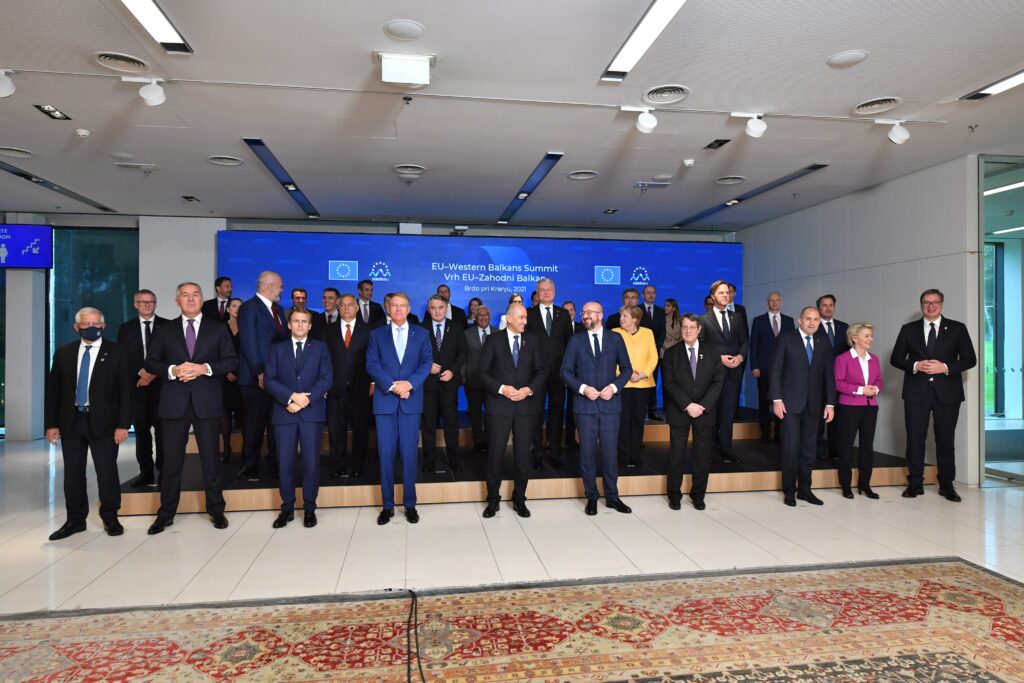On Tuesday, Prime Minister Janez Janša hosted an informal working dinner at Brdo pri Kranju. Practically all the important names of the European political summit were among the guests – from Angela Merkel to Sebastian Kurz, Stefan Löfven, and Charles Michel, who chairs the EU-Western Balkans Summit. On Wednesday, the leaders of the EU Member States and six partners from the Western Balkans gathered to discuss reaffirming the European perspective on the Western Balkans, which is in the common strategic interest of all countries involved and continues to be a common strategic decision.
Tuesday marks the start of one of the most important events of the Slovenian Presidency of the Council of the European Union – the EU-Western Balkans Summit. The Prime Minister of the Republic of Slovenia, Janez Janša, hosted an informal dinner for members of the European Council on Tuesday evening, and on Wednesday, the main event of the Summit – a meeting of the heads of governments of the EU Member States and countries of the Western Balkans – took place. The events will be chaired by the President of the European Council, Charles Michel, who will represent the European Union at the Summit, together with the President of the European Commission, Ursula von der Leyen.
On Tuesday in Brdo pri Kranju, President of the Republic Borut Pahor presented the German Chancellor Angela Merkel, who was also a guest at the informal working dinner, with the Order of Merit for Distinguished Service, which is Slovenia’s highest honour. Merkel received it due to her personal contribution to deepening the relationship between Slovenia and Germany and for her credible and trust-inspiring European leadership.
At the dinner, the leaders discussed the role of the EU in light of recent events in Afghanistan, the AUKUS security partnership (Australia, the United Kingdom and the United States trilateral partnership), and the development of our relations with China, the Government of the Republic of Slovenia said.
Austrian Chancellor Sebastian Kurz and Estonian Prime Minister Kaja Kallas also attended the informal working dinner. “A common understanding of global challenges and how to address them remains crucial. Along with this, unity is also important,” the Government of the Republic of Slovenia wrote on its official Twitter profile.
One year ago, Prime Minister Janez Janša and Austrian Chancellor Sebastian Kurz climbed the Slovenian route in the North Face of Mount Triglav after the working part of the Chancellor’s visit to Slovenia – which certainly strengthened our relations with the neighbouring country.
The High Representative of the Union for Foreign Affairs and Security Policy, Joseph Borell, also attended the informal dinner, which indicates that a debate on strategic action and the protection of European interests was likely also held.
The President of Cyprus, Nicos Anastasiades and the Prime Minister of Finland, Sanne Marin, also attended the informal event. The host, Prime Minister Janša, likely discussed the role of the EU in light of recent events in Afghanistan, the AUKUS security partnership and the EU’s relations with China with the two guests.
The Prime Minister of Luxembourg, Xavier Bettel, and the Swedish Prime Minister Stefan Löfven were also at the informal dinner in Brdo pri Kranju, hosted by Prime Minister Janez Janša. The three were expected to discuss strategic action and the protection of the European interests.
Of course, the President of the European Council, Charles Michel, who is chairing the EU-Western Balkans Summit, and the President of the European Commission, Ursula von der Leyen, also attended the dinner. They were probably also involved in the discussion on strategic action and the protection of European interests.
Among other attendees was also the Belgian Prime Minister, Alexander De Croo, and Prime Minister of the Netherlands, Mark Rutte.
Czech Prime Minister Andrej Babiš, and Hungarian Prime Minister Viktor Orban, represented the Visegrad group at the informal working dinner. The Visegrad group includes Hungary, Poland, the Czech Republic, and Slovakia. The Slovakian Prime Minister, Mateusz Morawiecki, also joined them.
Representatives of our remaining two neighbouring countries, the Italian Prime Minister, Mario Draghi, and the Prime Minister of Croatia, Andrej Plenković, also attended the informal dinner. The latter also talked to the Prime Minister of Kosovo, Albin Kurti, among others.
Prime Minister of Portugal, António Costa, who also attended the event, probably shared his experience in successfully tackling the covid-19 epidemic, as Portugal is one of the countries with the highest vaccination rate in the European Union.
The Prime Minister of Spain, Pedro Sanchez, President of the Republic of Lithuania, Gitanas Nausėda, and Irish Prime Minister, Micheál Martin, were also in attendance, among others.
Sara Bertoncelj


